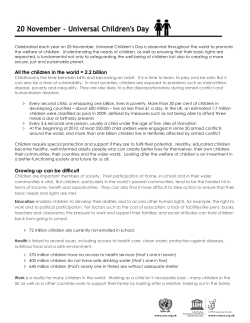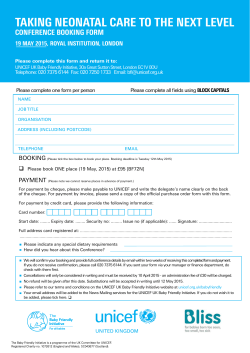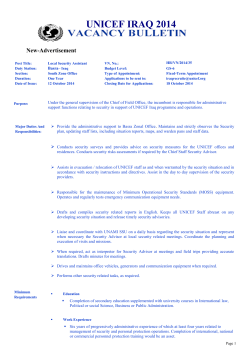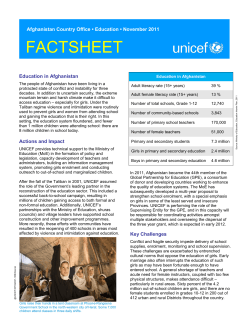
NGO Education - California YMCA Youth & Government
YMCA Youth & Government Model United Nations Forum on Non-Governmental Organizations TOPIC PREPARATION GUIDE NGO/15/TPG/4 Distr.: General March 2015 Original: English United Nations Children’s Fund (UNICEF): Universal Primary Education Section 1 Topic Background 1.1 The international community believes that all boys and girls should be able to go to school. This idea is called “Universal Primary Education.” This may seem like a foreign idea in the United States, where all children have to go to school until the 12th grade. But in the rest of the world, more than 60 million children do not go to school.i 1.2 Children do not go to school for many reasons: • In the African country of Malawi, there are not enough schools, desks, teachers, and books. Schools are overcrowded, typically with more than 75 students in one classroom. Because of poverty and hunger, children may not be healthy enough to attend school. And girls are often forced to drop out of school in order to work and support their families.ii • In the South Asian country of Bangladesh, children from minority groups are turned away from schools because they don’t speak the language of Bangla fluently. Many children live in poverty and in areas affected by natural disasters. Children are also asked to work instead of go to school.iii • In Afghanistan, the country is still rebuilding after years of war. There are not enough schools and teachers. An estimated 2 million children are out of school and only a third of 15-24 year olds can read.iv 1.3 Education is important for many reasons. A lack of education limits opportunities for jobs. It leads to poverty, hunger, inequality, which leads to conflict and violence. Lack of education means a higher chance of getting disease. And in a democracy, citizens cannot make informed decisions if they are uneducated. When children lack access to education, their community, their country, and the world suffer. 1.4 The goal of the international community is to achieve universal primary education by 2015. But if the international community does not take more action, it will fail to achieve this goal, and millions of children around the world will lose their chance at an education. A/12/TPG/6 Section 2 Past International Action 2.1 In 2000, the leaders of the world gathered to approve a plan called the Millennium Development Goals (MDGs). The purpose of these goals is to lift the world out of poverty. There are eight MDGs, and MDG 2 is “Achieving Universal Primary Education.” The goal is to ensure, by 2015, that all boys and girls in every country are going to school. Different organizations within the international community are working to achieve MDG 2.v 2.2 The United Nations Children’s Fund (UNICEF) is one international organization that helps governments achieve MDG 2. UNICEF works with governments and NGOs to train teachers and build schools. UNICEF helps governments provide children with meals at school, so that children aren’t hungry when they’re trying to learn and study. UNICEF also works with governments and NGOs to make sure that both boys and girls have equal access to education. In some cultures, girls are expected to drop out of school in order to get married and care for the elderly.vi 2.3 The Malawi-based HELP, which stands for Hope, Educate, Love, and Protect, is an NGO that also works on MDG 2. One of Malawi’s biggest challenges in education is not enough teachers, which leads to overcrowded classrooms. The average classroom size in Malawi is 75 students, which is a lot of students for one teacher to handle. To help teachers, HELP trains teacher aides, people who can assist teachers in the classroom and reduce the size of classrooms. 2.4 National governments, international organizations, and non-governmental organizations are working together to achieve MDG 2. But if they do not receive more help, the world will fail to achieve universal primary education by 2015. Section 3 Possible Solutions 2 • Access to Education: How can the international community help governments build more schools and train more teachers? Can the international community ask governments to eliminate school fees and provide free lunch? • Girls Education: How can the international community help governments provide equal education for girls? Can the international community ask families not to take their girls out of school? • Funding for Education: The United Nations estimates that in order for there to be universal primary education by 2012, there must be $11 billion in aid annually.vii How can the international community raise more money for universal primary education? A/12/TPG/6 Section 4 Bloc Positions 4.1 Africa and the Middle East: In Sub-Saharan Africa, about 30 million children are out of school. Along with South Asia, girls in rural communities in Africa are least likely to attend school.viii 4.2 Asia and the Pacific: In South Asia, 13 million children are out of school. Many of those who attend school through fifth and seventh grade are unable to read or answer math questions at a second grade level.ix 4.3 Latin America and the Caribbean: In this regional bloc, children have access to education but they not likely to complete primary school.x 4.4 Western and Other Countries: This bloc includes most of the world’s developed countries, which have already achieved universal primary education. Funding for universal primary education must come from developed countries, particularly in the West. Section 5 Further Research 5.1 Guiding Questions • • • What is universal primary education? What are the Millennium Development Goals? Has your country achieved universal primary education? If not, how is your country trying to achieve it? Which programs and NGOs are successful in promoting education? Can these programs and NGOs work in different parts of the world? 5.2 Research Sources • • • UN Millennium Project Report: http://www.unmillenniumproject.org/documents/Education-complete.pdf UNDP Country Reports: http://www.undp.org/content/undp/en/home/librarypage/mdg/mdg-reports/ UNICEF: Basic education and gender equality: http://www.unicef.org/education/index_44870.html i End Poverty 2015: Millennium Development Goals. United Nations. 18 August 2012. http://bit.ly/ZAc6la Educate Malawi. http://www.educate-malawi.org/services iii “What we do in Bangladesh.” Save the Children. 2009/2010. http://bit.ly/Zjz8YD iv “Achieve Universal Primary Education.” United Nations Development Programme Afghanistan. http://bit.ly/ZAbZ90 v “Goal 2: Achieve Universal Primary Education.” United Nations. http://www.un.org/millenniumgoals/education.shtml vi “Achieve Universal Primary Education.” UNICEF. http://www.unicef.org/mdg/education.html vii End Poverty 2015: Millennium Development Goals. viii End Poverty 2015: Millennium Development Goals. ix End Poverty 2015: Millennium Development Goals. x Achieving the Millennium Development Goals with Equality in Latin America and the Caribbean: Progress and Challenges. United Nations Development Programme. 2010. http://bit.ly/VA1sVU ii 3
© Copyright 2025












